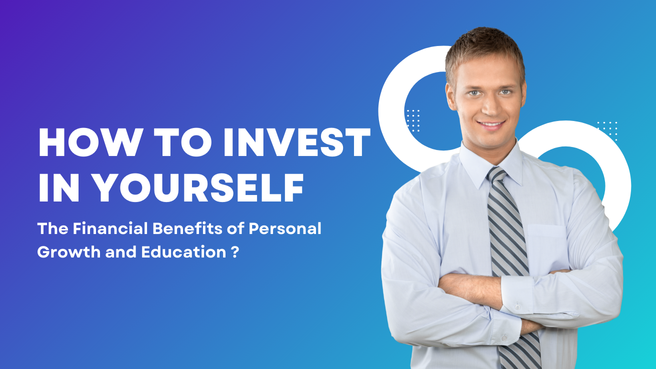
You save ₹5,000 every month for two years. That’s ₹1,20,000. But instead of letting it sit idle, you invest it in a professional course or skill upgrade. Over time, this could increase your annual salary by ₹3,00,000.
Doesn’t that sound like a wise move?
A study by the World Bank shows that every additional year of education increases an individual’s earning potential by 10-20%. This isn’t just about education but investing in skills, health, and personal growth.
If you’re wondering, “Can this help with financial goals like managing a balance transfer personal loan?” Absolutely! Let’s explore how self-investment pays off.
Why Investing in Yourself is a Smart Financial Decision
Think about this: what do CEOs like Sundar Pichai or Satya Nadella have in common? They didn’t just stop learning after their formal education. They kept investing in themselves.
Ask yourself: what skills or habits are holding you back? Could gaining new skills help you save money, earn more, or even clear that balance transfer personal loan faster?
For example, if you learn Excel or project management, you could land a promotion with a 30% salary hike. Say your current salary is ₹6,00,000 annually. A 30% increase means ₹1,80,000 extra every year! That’s like recovering your course fee within a few months.
Key Areas for Self-Investment
Education and Skills
Upskilling is the fastest way to grow financially. Whether it’s coding, public speaking, or data analytics, every skill adds value. For example:
| Skill Learned | Cost of Course (₹) | Potential Salary Hike (₹) | ROI (%) | Time to Recover Cost (Months) |
| Data Analytics | 40,000 | 2,40,000 | 500 | 2 |
| Public Speaking | 10,000 | 60,000 | 500 | 2 |
| Digital Marketing | 30,000 | 1,20,000 | 300 | 3 |
Investing in yourself ensures long-term returns.
Health and Fitness
Good health directly impacts productivity and reduces medical costs. Here’s how:
- Regular gym memberships (₹1,000/month) can save ₹15,000 annually in medical expenses.
- Eating healthy could reduce hospital visits and long-term chronic issues like diabetes.
- Walking daily boosts energy, making you more productive and financially effective.
The Financial Returns of Personal Growth
Think about someone who invests ₹50,000 in a certified financial planning course. This allows them to get a ₹12,000/month side gig as a consultant. In a year, they earn ₹1,44,000—almost 3x their investment.
Similarly, gaining negotiation skills can save you money directly. Let’s say you negotiate a 5% discount on your house rent of ₹20,000/month. That’s ₹1,000 saved monthly or ₹12,000 annually!
Practical Tips to Invest in Yourself
Here are actionable ways to grow:
- Set Clear Goals: Decide what skills or habits you need to upgrade.
- Budget Smartly: Save 10% of your income every month for courses, books, or coaching.
- Leverage Free Resources: Use platforms like Coursera, Khan Academy, or YouTube.
- Start Small: Begin with a ₹2,000 course to test waters.
- Track Progress: Measure how your investment impacts your finances.
- Network Wisely: Attend events and meet mentors who can help you grow.
Overcoming Challenges
Many people don’t invest in themselves due to time or money constraints. But let’s break this down.
- Excuse 1: “I don’t have time.”
Dedicate just 30 minutes daily. That’s 15 hours a month! Enough to finish a short course. - Excuse 2: “I don’t have money.”
Use free resources or budget ₹500 weekly. Skip one coffee or dining out—it’s doable. - Excuse 3: “I’m too old.”
Successful examples like Colonel Sanders (KFC founder) show it’s never too late.
Conclusion
When you invest in yourself, you create opportunities to earn more, save more, and grow sustainably. Whether it’s learning a new skill or managing finances better, the returns are undeniable.
Start small. Even a minor step, like improving your time management skills, can help you clear a balance transfer personal loan faster. Your future self will thank you.
FAQs
- How much should I spend on self-investment annually?
Allocate at least 10% of your income for personal growth. - Can investing in health reduce financial strain?
Yes, healthier habits reduce medical costs by up to 50%. - What’s the best way to learn without spending too much?
Use free platforms like Khan Academy or low-cost online courses. - Does personal growth really impact income?
Yes, upgrading skills can boost earnings by 20-50%.
